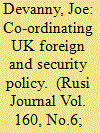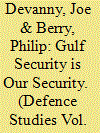| Srl | Item |
| 1 |
ID:
142306


|
|
|
|
|
| Summary/Abstract |
Since 2010 the National Security Council (NSC) has won plaudits for improving the clarity and regularity of national-security co-ordination. It has also been criticised for strategic shortcomings and a lack of capacity to drive forward the implementation of its decisions across government. Joe Devanny appraises the NSC's performance and future prospects, although without access to NSC proceedings it is difficult to infer the quality of its decisions or the coherence of its policies from the ambiguous evidence of apparent policy outcomes or public statements. So closely is the NSC associated with Prime Minister David Cameron that his expected retirement by 2020 renders its future uncertain.
|
|
|
|
|
|
|
|
|
|
|
|
|
|
|
|
| 2 |
ID:
178637


|
|
|
|
|
| Summary/Abstract |
“Global Britain” has become the framing concept for post-Brexit foreign policy pursued by successive Conservative prime ministers. Despite exaggerated rhetoric to the contrary, this has not led to a significant shift in Britain’s Gulf strategy, but rather intensified the pursuit of the existing network of bilateral relationships underpinned by security cooperation, defence exports and inward investment. A modest uplift of UK military presence in the Gulf has not demonstrably increased UK influence in the region or over the regional decisions of the Trump administration. This leaves the UK more exposed to risk from deteriorating relations between the US and Iran. It also highlights the delicate balance between Britain’s increasing focus on pursuing domestic economic objectives and its modest defence, diplomatic and security contribution to stability in the Gulf. As Saudi Arabia and the UAE pursue increasingly active and independent regional policies, the UK must reappraise commitments implicit in its interdependent trade- and security-focused strategy to prepare for the possibility of difficult choices, both between allies and about the nature of UK involvement in future regional conflicts.
|
|
|
|
|
|
|
|
|
|
|
|
|
|
|
|
| 3 |
ID:
163355


|
|
|
|
|
| Summary/Abstract |
In this article, Joe Devanny, Robert Dover, Michael S Goodman and David Omand explore the current problems facing intelligence analysis and analysts in the UK and consider what might be done to tackle them. They argue that nothing less than a revolution in the British government’s approach to intelligence assessment is required and that this ought to take the form of a School of Intelligence Assessment within a properly financed and structured National Security Academy.
|
|
|
|
|
|
|
|
|
|
|
|
|
|
|
|